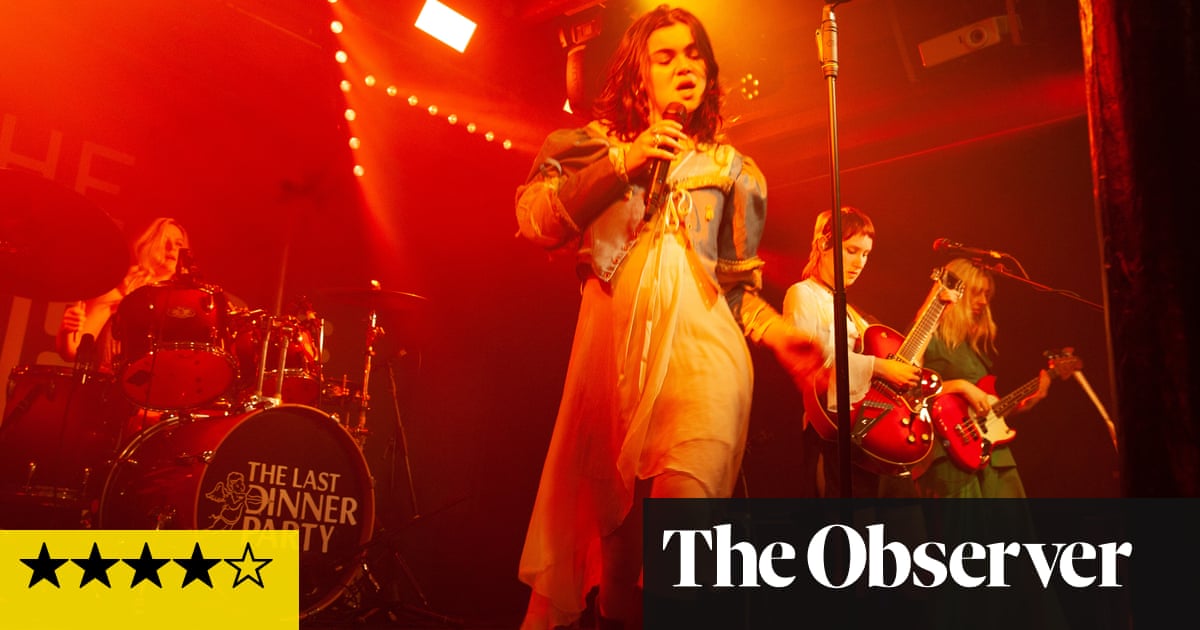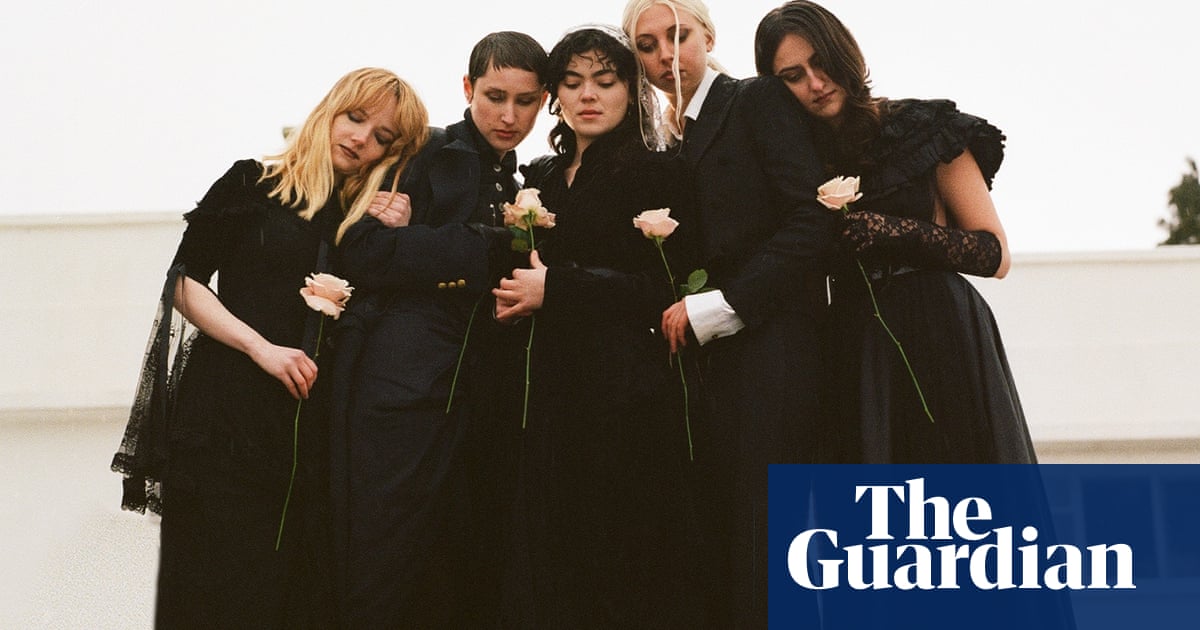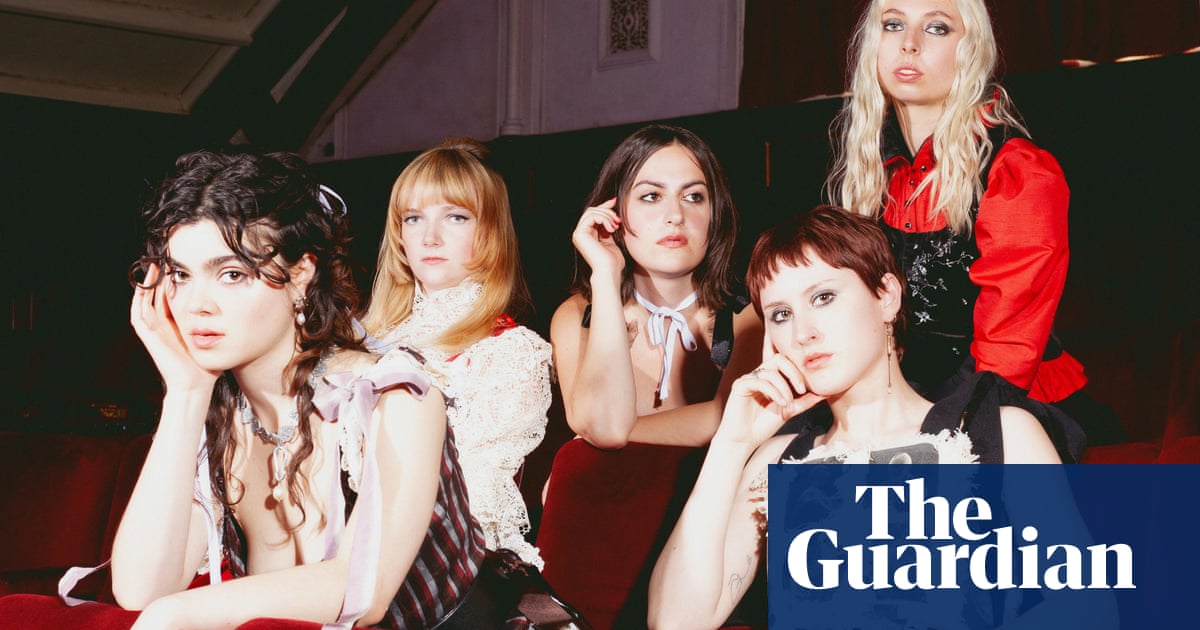
Someone has upended the contents of a costume department’s laundry basket on a 10-legged prog-pop band. They are slashing their way out of the corsetry and linens with flutes and keytars. Or at least that’s what it looks like when the Last Dinner Party take the stage of this renowned Bristol shoebox in a swashbuckling blur of flung hair, Napoleonic finery, mandolins and even some 21st-century garb, honouring a rescheduled gig that could easily have been upgraded to a much larger venue.
The band are the recently crowned winners of what might be called the new band double – the BBC Sound of 2024 nod and the Brits Rising Star award. By this weekend, they will have released their debut album, Prelude to Ecstasy, and played London’s 1,800 capacity Roundhouse; their autumn tour venues go larger still. Notably, it’s the first time in 11 years that a guitar band have won the BBC Sound of gong. The fact that Haim won in 2013, and that the Last Dinner Party are also largely female (as well as non-binary), chimes nicely too.
It’s also a bit like watching firecrackers going off indoors. Guitar necks entangle; everyone is cheek by jowl by bouffant sleeve. Singer Abigail Morris – a shoo-in to play the young Helena Bonham Carter in a biopic – makes her vocals a whole-body experience, head-banging and elbow-thrusting her way around, hanging off the listed venue’s iron support pillars. It’s worth noting in passing that the independently owned, 450-cap Fleece is one heroic success story in a bleak landscape for grassroots venues; they used a pre-pandemic grant to completely refurbish the place during lockdown. By contrast, the nearby Bath Moles shut in December; a recent Music Venues Trust report bears witness to the closure of 16% of the nation’s small venues last year. You may have heard the MVT’s Mark Davyd on the Today programme a fortnight ago, making the point that a £1 levy on arena tickets would virtually solve a problem that, cultural destruction and the loss of jobs aside, will inevitably cause a supply bottleneck for new talent – bands such as the Last Dinner Party. The five-piece’s rise through gigging is one of the factors that has set them apart in an age of digital-first fame.
Ironically, it may have been the Last Dinner Party’s commitment to doing things the old-fashioned way that prompted a backlash when they finally released a debut single last spring. Emerging fully formed led to accusations of the band being “industry plants”, a nebulous concept often levelled at those – often female – whose success is deemed too swift.
Tonight, there are no questions about their musician chops, or the proof of their concept: songs about passion, Catholic guilt and toxic relationships, all relayed with maximum prancing about. Guitarist Emily Roberts sports a signature St Vincent guitar and peels off rock solos with a Mona Lisa smile. You can hear the hours spent in a Queen covers band (she was Brian May), but Roberts’s precision and sangfroid comes from her conservatoire background. In 2020, she was a semi-finalist in the BBC Young Jazz Musician of the Year competition; in TLDP she also handles mandolin and flute duties on songs such as Gjuha and Beautiful Boy.
Georgia Davies’s solid bass has strips of white fabric flying from it as well as she dodges singing guitarist Lizzie Mayland’s own angular shapes. On Morris’s other flank, keyboard player Aurora Nishevci is an interloper from modernity who looks like a young woman on a night out rather than a dishevelled lady-in-waiting. She is also the Guildhall-schooled composer who bookends the band’s vivid debut album with classical intro and exit music, and sings Gjuha – “tongue” – in Albanian – a song about her difficulties with her native language. (Touring drummer Rebekah Rayner completes the lineup.)
The Last Dinner Party romp through much of that debut album in an hour-long set curtailed by technical hitches but brimming with verve. Gender roles come up for scrutiny on Beautiful Boy, about a guy who gets away with all sorts because he is so “pretty”. The whole band begin the song with an extended piece of a cappella harmonising.
During Caesar on a TV Screen, another track in which Morris ponders gendered power dynamics, fans down the front scream along to one of the band’s statements of grandiose intent. “When I was a child, I never felt like a child,” sings Morris, “I felt like an emperor with a city to burn!”
TDLP’s fusion of Kate Bush cut-glass diction with Måneskin pomp-rock will not be for everyone. There is a reason why Justin Hawkins from the Darkness sings their praises, as well as Florence Welch of Florence + the Machine, whose Opheliac maximalism is the band’s most obvious influence. There’s a hamminess to their idea of “rock” that sits a little awkwardly with their indie toilet circuit bona fides. But it’s not like the Last Dinner Party didn’t warn everyone. They didn’t want to be another post-punk band. They told one interviewer that rather than sing about the cost of living crisis, the Dinner vibe was more “end-of-the-world orgy”.
After Sinner, a track part-sung by Mayland, the gremlins set in, and the Last Dinner Party ad lib gamely on before leaving the stage for a while as power issues to the stage are resolved. “This is like Lana Del Rey at Glastonbury!” jokes Morris, referring to Del Rey’s curtailed set headlining the Pyramid stage in 2023. They return and opt to close with their debut single, Nothing Matters – the one that was so assured, it allegedly couldn’t have been the work of a group of ambitious young women who had taken the time to perfect their vision, and get management and a label on board. “And I will fuck you, like nothing matters,” sings Morris. She gestures at the heavens, implying the technical difficulties: “Nothing matters!”












